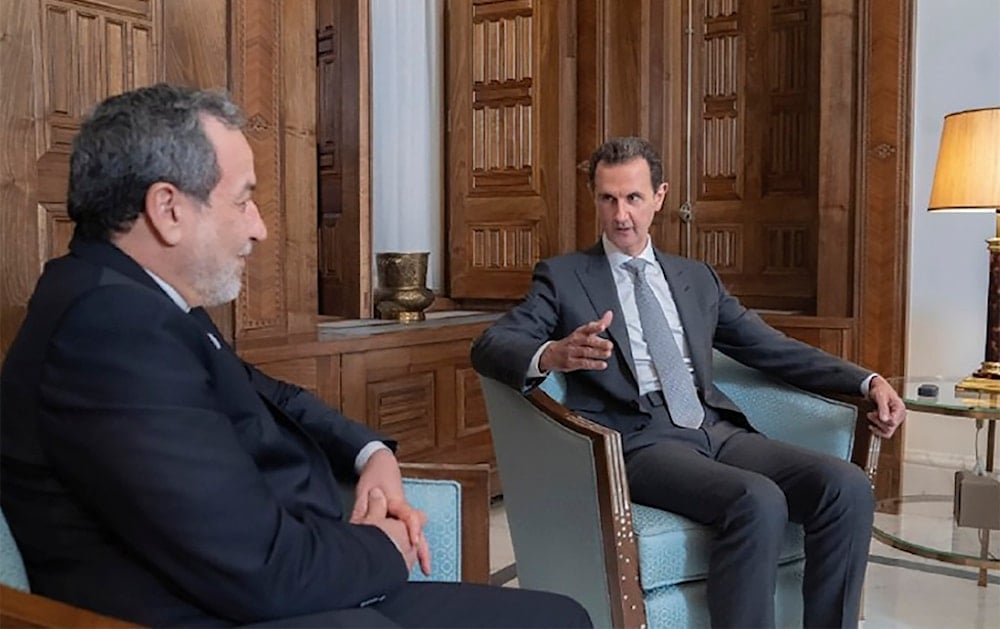Assad reiterates pledge to fighting terrorism in call with Araghchi
Syrian President Bashar al-Assad meets with Iranian Foreign Minister Abbas Araghchi in light of the terrorist attacks in Syria.
-

Iranian Foreign Minister Abbas Araghchi, left, and Syrian President Bashar Assad meeting in Damascus, Syria, Sunday, Dec. 1, 2024 (Syrian Presidency Telegram page)
Syrian President Bashar al-Assad reiterated on Sunday his country’s unwavering determination to combat terrorist organizations with full force across all Syrian territories.
During his meeting with Iranian Foreign Minister Abbas Araghchi, al-Assad emphasized that combating terrorism, dismantling its infrastructure, and cutting off its resources serve not only Syria but also the stability of the entire region.
He described Araghchi’s visit as significant, especially in light of the current critical circumstances, highlighting it as a message of Iranian support for Syria and other members of the Axis of Resistance against the Israeli occupation. "It is a visit of great meaning and appreciation," Assad said.
The Syrian president underscored the importance of allies and friends in confronting foreign-backed terrorist attacks and thwarting their plans. He praised Iran’s steadfast support for Syria’s stability and security, calling it a responsible and commendable stance against the "malignant phenomenon of terrorism."
Assad further stressed the necessity of a collective and responsible effort by all regional states to eradicate terrorism, which, he noted, primarily benefits the enemies of Islamic nations, particularly the Israeli occupation. "The Syrian people are more determined than ever to uproot terrorism," Assad stated.
Iran’s continued commitment
For his part, Iranian Foreign Minister Abbas Araghchi reaffirmed Tehran’s readiness to provide comprehensive support to the Syrian government, military, and people in their fight against terrorism.
Araghchi emphasized Iran’s steadfast commitment to supporting Syria against Israeli aggression and terrorist groups, describing this strategic approach as essential to ensuring Syria's stability and regional security.
"The recent actions of terrorist groups are part of a conspiracy by enemies to destabilize the region," Araghchi said, linking these activities to the United States and the Israeli occupation. He argued that such moves are attempts to compensate for the failures of Israel in confronting the Resistance Front.
Expressing confidence in Syria’s resilience, Araghchi stated, "Just as Syria triumphed over terrorism in the past, it will succeed again in defeating terrorist groups and their backers."
Araghchi’s visit comes as the Syrian army intensifies operations against terrorist groups in parts of Aleppo, Idlib, and Hama provinces to counter recent attacks.
Terrorism only understands force
Syrian President Bashar al-Assad pledged to use force to eradicate "terrorism" during a phone call on Sunday with the Acting President of the Republic of Abkhazia, according to the state news agency SANA.
Al-Assad pointed out that "terrorism only understands the language of force, and that is the language which we will break it and eliminate it with, whoever its supporters and sponsors are," SANA reported.
Hours later, it was announced that the Syrian Arab Army successfully reclaimed key areas along the administrative border between Hama and Idlib, marking significant progress in its efforts to stabilize the region amid widespread terrorist raids.
This advancement was achieved through a series of intensive airstrikes targeting positions held by terrorist groups, particularly in the vicinity of Morek, north of Hama. The strikes delivered a critical blow to the terrorist forces, with over 80 militants killed and dozens more wounded.
In Aleppo, a decisive military operation at the al-Basel roundabout further weakened terrorist groups, forcing them to acknowledge their heavy losses.
An Al Mayadeen correspondent reported that the Syrian army has regained control over nearly all the villages in the Hama countryside, solidifying its presence in the area. Additionally, efforts are underway to secure the Athraya-Khanaser-Safira road in the southern countryside of Aleppo.
However, challenges persist as armed groups in the region are reportedly preventing civilians from leaving al-Safira and blocking humanitarian aid from entering, further exacerbating the plight of residents.

 4 Min Read
4 Min Read








